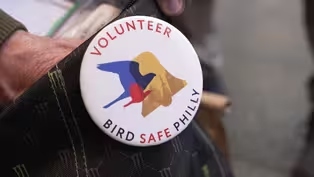
Why U.S. domestic workers lack basic labor protections
Clip: 6/15/2024 | 5m 31sVideo has Closed Captions
Why U.S. domestic workers have fewer labor protections than other employees
In many American households, domestic workers like nannies, housekeepers and home health aides perform essential tasks. But they also have fewer rights and protections than most U.S. workers. Oxfam senior researcher Caitlin Henderson joins Ali Rogin to discuss.
Problems playing video? | Closed Captioning Feedback
Problems playing video? | Closed Captioning Feedback
Major corporate funding for the PBS News Hour is provided by BDO, BNSF, Consumer Cellular, American Cruise Lines, and Raymond James. Funding for the PBS NewsHour Weekend is provided by...

Why U.S. domestic workers lack basic labor protections
Clip: 6/15/2024 | 5m 31sVideo has Closed Captions
In many American households, domestic workers like nannies, housekeepers and home health aides perform essential tasks. But they also have fewer rights and protections than most U.S. workers. Oxfam senior researcher Caitlin Henderson joins Ali Rogin to discuss.
Problems playing video? | Closed Captioning Feedback
How to Watch PBS News Hour
PBS News Hour is available to stream on pbs.org and the free PBS App, available on iPhone, Apple TV, Android TV, Android smartphones, Amazon Fire TV, Amazon Fire Tablet, Roku, Samsung Smart TV, and Vizio.
Providing Support for PBS.org
Learn Moreabout PBS online sponsorshipJOHN YANG: In many American households, domestic workers like nannies, housekeepers, and home health aides perform essential tasks.
But as Ali Rogen reports they also have fewer rights and protections than most U.S. workers.
ALI ROGIN: Each day nearly 2.5 million nannies, aides for the elderly and home cleaners do jobs that allow much of the rest of the American workforce to do theirs.
But despite being such a foundational part of the economy, many of these workers are excluded from key workplace protections.
Those include the Fair Labor Standards Act and the Occupational Safety and Health Act, which respectively cover wages and workplace safety.
Protections also vary by state, 11 states and the District of Columbia have passed their own Domestic Workers Bills of Rights.
But there is no such federal law.
Members of Congress have tried and failed to pass a federal version for several years.
Kaitlyn Henderson is a Senior Researcher at Oxfam, a global organization fighting poverty and injustice, where she studies how states treat workers and working families.
Caitlin, thank you so much for being here.
First of all, why have domestic workers historically been excluded from these sorts of protections?
KAITLYN HENDERSON, Senior Researcher, Oxfam: So unfortunately, that reflects a long history of sexual and racial discrimination in this country, where black women were really excluded from labor protections in the 1930s during President Franklin Roosevelt's New Deal.
Unfortunately, when we were creating this social safety net that still exists today, a lot of Southern senators were very nervous about including black workers in frameworks of minimum wages, overtime protections, and the rights to organize.
ALI ROGIN: And beyond their exclusion from these statutory protections, why is it that these workers are so vulnerable to mistreatment?
KAITLYN HENDERSON: As you mentioned earlier, domestic workers are excluded from the Occupational Safety and Health Act, which means that a lot of protections most workers have for their workplace does not extend to domestic workers, because usually that means people's homes, so they're very exposed to issues of discrimination and harassment.
Domestic workers are also not included in the Civil Rights Act from the 1960s.
So they're uniquely exposed to types of vulnerabilities that most workers don't have.
The majority of domestic workers in the United States are women, women of color, and especially immigrants.
And as another collective of workers that has also been excluded from the National Labor Relations Act, which establishes the right to unionize.
A lot of these workers feel uniquely exposed and vulnerable, and not as comfortable bringing up issues to their employer, especially since they are very classically at will.
And their employers, which is, again, often families individuals can terminate their employment at any time.
ALI ROGIN: As you mentioned, there are efforts to correct these issues, what is happening on the federal level?
KAITLYN HENDERSON: So we have in front of Congress today a bill that's called the Domestic Workers Bill of Rights, which is a very exciting piece of legislation.
As you mentioned, a similar piece of legislation has passed in 11 states and D.C. and Puerto Rico and several cities.
So we know that it works really well.
This would be a piece of legislation that establishes minimum wage provisions, overtime protection, protection at work from harmful chemicals, for example, protection against discrimination and harassment and the ability to collectively organize.
ALI ROGIN: There have been efforts for several years now to pass this bill of rights.
Why does it keep getting stalled, apparently?
KAITLYN HENDERSON: We're waiting for the political will from a lot of individuals to see the value in this.
We know as you mentioned, domestic workers are the workers that let all other work happen.
So these are intrinsically valuable, absolutely essential workers to our economy.
Hopefully, people will change their minds and realize the importance of this sooner than later.
ALI ROGIN: Another piece of this seems to be making sure that workers know their rights.
Why is it such a challenge to reach these workers where they are and close that awareness gap?
KAITLYN HENDERSON: It's so hard when your workplace is someone's home, and you work by yourself.
One of the best ways to organize workers is when you find them in a collective and domestic workers usually work alone or in a vacuum.
So it's taken a lot of time for the National Domestic Workers Alliance among other organizations to reach out build community and collectively organize these workers.
ALI ROGIN: What sort of mistreatment typically happens to this segment of the workforce?
KAITLYN HENDERSON: Because they're working alone at the house often, they are extremely exposed to issues of sexual harassment, discrimination, exposure to chemicals in the cleaning products as an example.
There's also a tendency to not pay workers if they are canceled upon if their shift is canceled at the last minute.
So it's hard for these workers to have a plan in terms of if they have their own caregiving responsibilities.
ALI ROGIN: How did the COVID pandemic affect the domestic workplace?
KAITLYN HENDERSON: COVID was a huge problem.
So especially since we were all told to go home, shelter at home, and that's usually the workplace for domestic workers.
So it was an incredibly economically vulnerable moment for domestic workers that we're still trying to solve for today.
ALI ROGIN: It seems contradictory that a part of the workforce that is so foundational to the American economy is also treated as part of the periphery.
Does that perception need to change?
And if so, how does that happen?
KAITLYN HENDERSON: Absolutely care work really is the work that makes all other work possible.
And I think the COVID-19 pandemic did an important thing in terms of allowing all of us to recognize how crucial care work is whether it's childcare, elder care, care for people with disabilities or domestic work.
JOHN YANG: That's Kaitlyn Henderson with Oxfam, thank you so much for being here.
KAITLYN HENDERSON: Thank you.
How Philadelphians are protecting birds from window crashes
Video has Closed Captions
Clip: 6/15/2024 | 9m 17s | How Philadelphians are working to protect birds from deadly window collisions (9m 17s)
Study shows why LGBTQ+ people may have higher cancer risk
Video has Closed Captions
Clip: 6/15/2024 | 5m 23s | Study highlights why LGBTQ+ people may be at greater risk for cancer (5m 23s)
Providing Support for PBS.org
Learn Moreabout PBS online sponsorship
- News and Public Affairs

FRONTLINE is investigative journalism that questions, explains and changes our world.

- News and Public Affairs

Amanpour and Company features conversations with leaders and decision makers.












Support for PBS provided by:
Major corporate funding for the PBS News Hour is provided by BDO, BNSF, Consumer Cellular, American Cruise Lines, and Raymond James. Funding for the PBS NewsHour Weekend is provided by...

